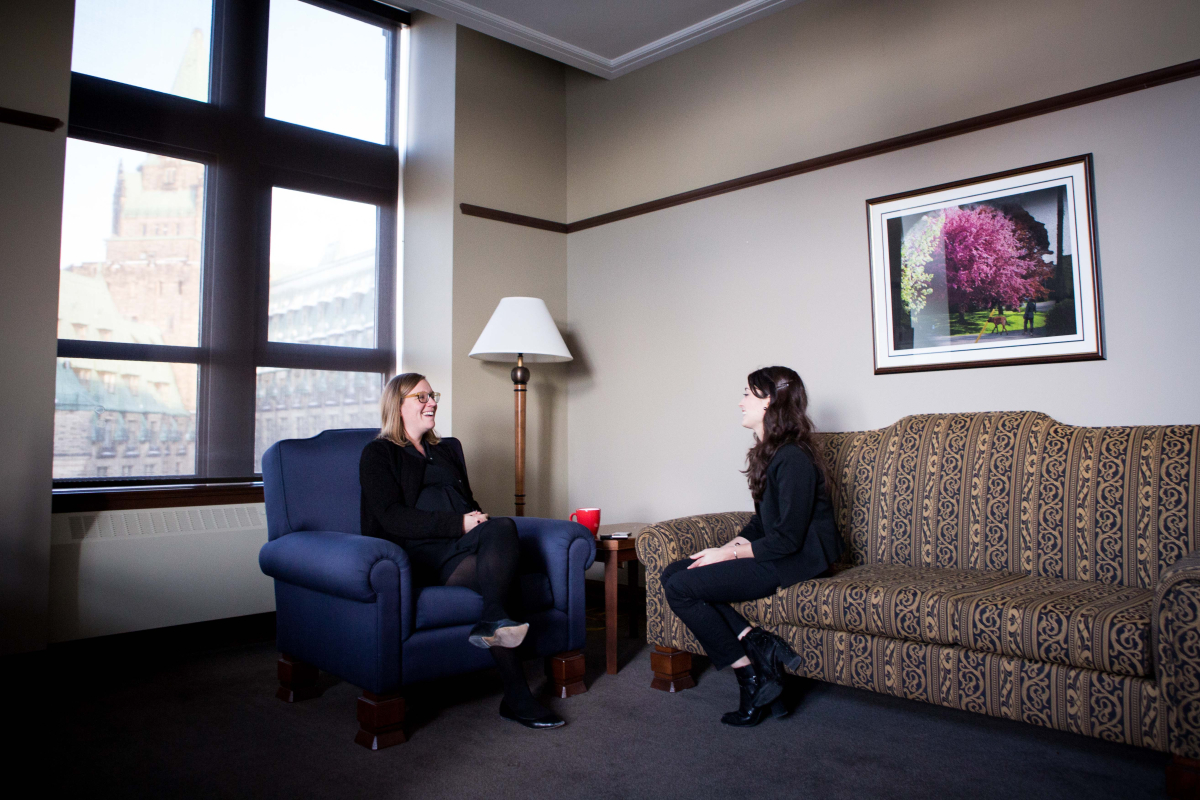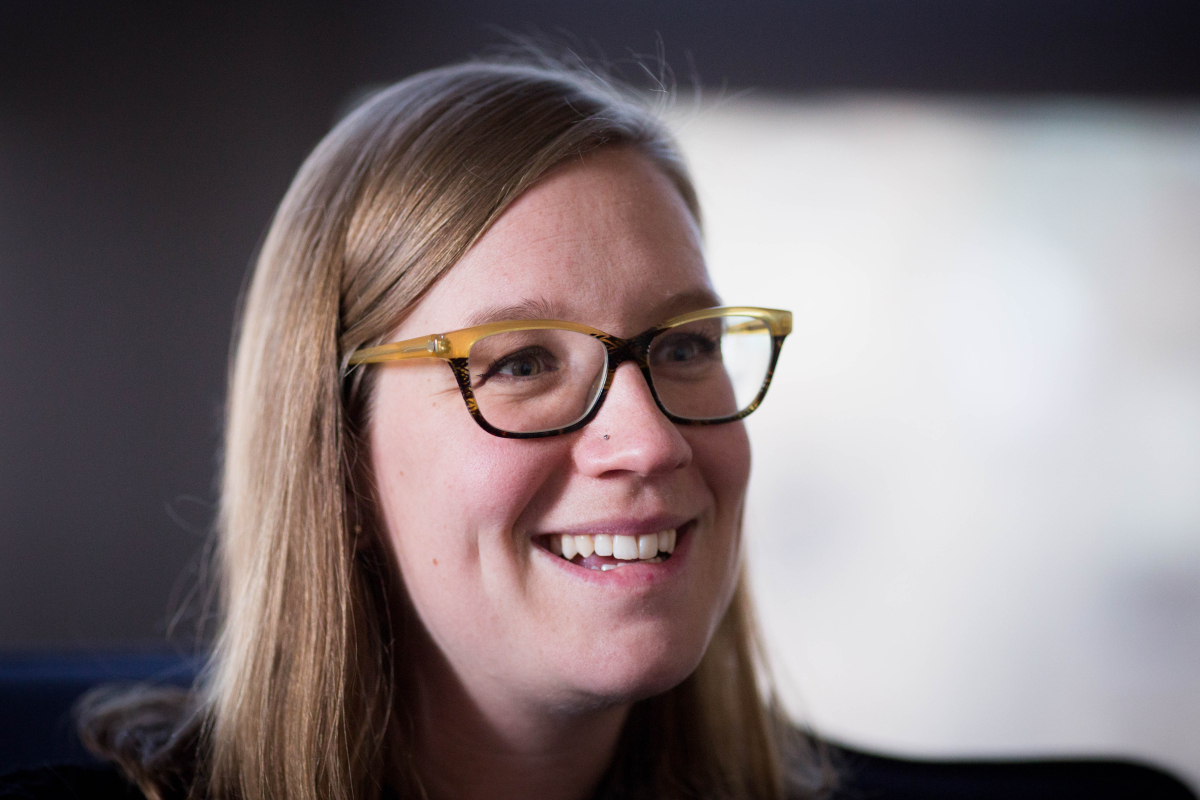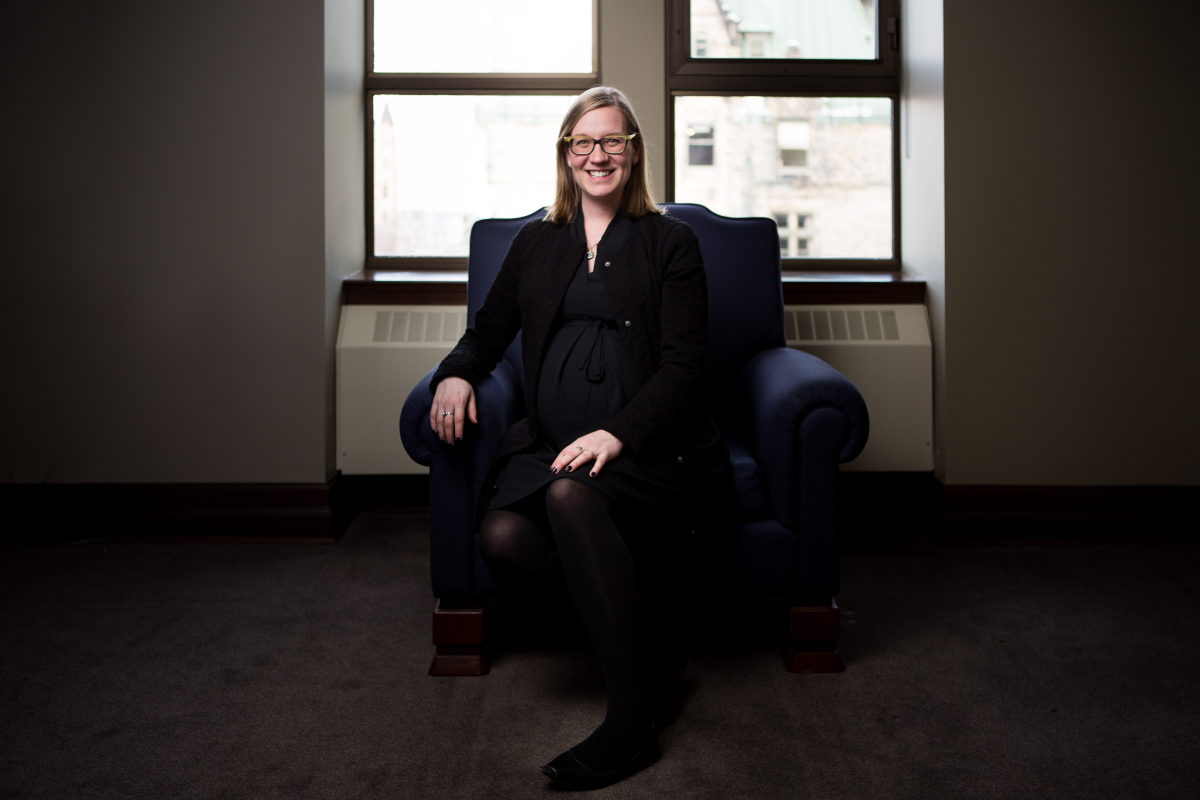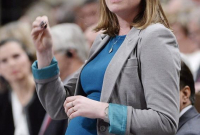Support strong Canadian climate journalism for 2025
It was a memorable moment in Canadian politics.
In February last year — with only a few weeks in cabinet under her belt — newly-minted Democratic Institutions Minister Karina Gould broke the news that the Trudeau government would not deliver on a keystone promise to change Canada's electoral system.
The activists had a field day, the columnists had their punchline, and Gould had brand new marching orders. At the time, Green Party leader Elizabeth May accused the prime minister of tossing both Gould and her predecessor "under the bus."
But the rookie MP for Burlington, Ont. — known for her polished speaking skills — never really saw it that way. Asked one year later if she still gets flack from Canadians for that infamous Parliament Hill press conference, she gives a cool but calculated response.
"Probably depends on who I’m meeting with," says Gould from her corner office in Ottawa's Justice Building. "There are a lot of people who are really passionate about changing the way that we cast our votes and how we elect our governments, and those are really valid opinions to have had."
Gould also has a mandate to stop hackers and foreign agents from interfering in the next Canadian election. As part of that mandate, she says she has already learned that the same tools, values and principles that have made Canada's democracy "so strong" are the same ones used by adversaries to undermine it and create a "crisis of trust and confidence" in important Canadian institutions.
While she says some cyber threats are outside of our control, Gould explains that Canada is preparing for those threats. She remains "hopeful and optimistic" she will deliver on her mandate.
Gould spoke to National Observer shortly after attending cross-country meetings on political party leaders' debates, and shortly before taking maternity leave, becoming the first cabinet minister in Canadian history to do so. And despite its rocky start in the spotlight, she says her first year as democratic institutions minister has been full of successes.
Below is a transcript of the interview, edited for brevity and clarity.
Q: Your mandate letter includes several key tasks, including defending Canada's electoral process from cyber threats and creating a commissioner for election debates. What takes up most of your time?
“That’s a good question because you forgot to mention that I’m also a member of Parliament... I’m pretty much in Burlington every weekend when I can be... Really making sure I’m still a good constituency MP is important to me and bringing forward the issues that matter to my constituents.
When you’re in cabinet, you are responsible for your portfolio, but then you also sit on different committees as well, so you get views into different areas of the government. I don’t know if I could give you an exact breakdown, because it changes every week depending on what’s going on, but certainly my main focus is my portfolio.
Today I was really pleased because Bill C-50, which is our political fundraising amendments to the Canada Elections Act passed report stage, so it’s going onto third reading and will be in the Senate soon... Then of course, there’s the debates commission, there’s also cyber security...
And then of course, there’s also the work that I’m doing to update the Canada Elections Act as well and Bill C-33.
Q: Can you tell me a little bit about your role in cyber security, and how your ministry fits in with all of the pieces in national defense and public safety that are working on the same topic?
"I’m also working with the minister of heritage and the minister of information science and economic development on thinking about what we need to be doing more broadly with regards to cyber security, our elections, and democracy...
The prime minister mandated me to kind of lead the government’s efforts, so what I’ve been doing until now is working on co-ordinating the efforts, understanding what resources we already have at our disposal and making sure that we’re choreographed and aligned in terms of providing those supports and resources.
Foreign influence in elections is not a new issue, but the way that it’s being done is a new issue. It’s a new tool to do the same kind of old things, in a way that connects directly with Canadians, and voters particularly, than it ever has in the past...
(My understanding of the issue) continues to evolve as new things come to light that have happened in other countries, and really engaging our counterparts abroad as well to see what their best practices are, learn from their experience and make sure that we’re bringing those in as we’re developing our plan here in Canada."
Q: With the cyber security knowledge you're now privy to, have you learned anything that has shocked you?
"Well I think the thing that kind of stays with me the most is the fact that the very tools, values and principles that have made our democracy so strong are the same ones that adversaries try to use to undermine it, and to create a crisis of trust and confidence in the institutions that we need to rely on to have successful elections and a strong democracy... The fact that adversaries are trying to use those very channels to shake that confidence and that trust is what we need to be alive and alert to, and what we need to be preparing Canadians for for the next election.
"It’s very possible that nothing happens and that would be great. That’s the best of everything. But that might also be because we’re taking the necessary steps to ensure that it doesn’t. But in the event that we have a disinformation campaign or a breach of a public institution during the election, we need to make sure that Canadians have the information, tools and resources they need to make those judgments on their own.

Q: When you talk about steps to prevent these threats, how many of them are public — like education campaigns — versus steps that happen behind closed doors at the CSE or CSIS?
"I think it’s important to be open and transparent about this. I think it’s important for Canadians to know as much as possible. I’m still in that information gathering stage and that co-ordinating stage. I hope to be able to come forward in the near term, well ahead of the next election.
But one of the things Canadian can rest assured about is the fact that we asked the CSE (Communications Security Establishment) to do a threat assessment for cyber security purposes in elections... It was the first publicly available cyber security threat assessment for democratic institutions and elections released in the world. That’s a pretty big deal and that’s a great first step.
The other thing that Canadians can rest assured about and know about is that we also empowered the CSE to work directly with political parties to provide advice and guidance in terms how they can best protect themselves. We’re continuing to have those conversations and think about what things we need to be doing, whether it’s with regards to social media platforms, education campaigns, me talking to the media and the role of the media as well, because the media plays a big role in how people consume information. And so, how they’re reporting on disinformation campaigns is really important as well."
Q: Since we're talking about the media, let's talk about the #MeToo movement. You have a unique experience in that you've entered the world of politics while this is going on. What's it like to mature as a politician in the #MeToo era?
"This is not unique and it’s not new. So I think it’s a good thing that we’re talking about it and I think it’s really important that we have these conversations. I think that the objective — while I laud the #MeToo campaign — is actually not about getting women to come forward and tell their stories, it’s about changing behaviour. That’s what we want to see.
How is the media helping to advance that and actually change that behaviour, how are we as leaders in our communities and our workplaces making sure that we’re changing behaviour?
I’m hoping that Bill C-65 (An Act to amend the Canadian Labour Code), which has all party support and got advanced rapidly through the house — it's been sent to committee — is actually going to set some standards and processes in place so we can create an environment where victims and survivors of harassment and assault can come forward in a way that feel safe, in a way that they feel is actually going to respect them and actually going to see results.
"Think that is fundamental to both ensuring that victims and survivors see the justice that’s right for them, but also in terms of changing behaviour because it’s time, time's up."

Q: Let's jump back to election debates. Are you working on anything that could mandate that all major party leaders — for the Greens and the Bloc, which have sometimes been excluded — be invited to debates in the future?
"That’s one of the questions that’s being asked right now... Myself and my parliamentary secretary held roundtables around the country in Halifax, Montreal, Toronto, Winnipeg and Vancouver with different stakeholders and backgrounds, and there's also a public consultation that's open until Feb. 12 on my website where the public can send in information...
For Canadians it’s been very clear that the debates in both official languages are important moments for them to get to know political leaders, to see how someone might react as a prime minister, to see how they interact. One of the comments that always struck me in some of the submissions we’ve received, is that what they like about debates is that it’s a chance for them to see how leaders act spontaneously.
...Some people have argued that it should be very, very clear and in the mandate of the commissioner to ensure that we know exactly who is participating before. Other people have said, 'Give the commissioner that flexibility to make those determinations.' But the one thing that’s been consistent is that whatever that decision is, it’s communicated early in advance and publicly so that there’s no confusion around it, and the criteria are clearly understood by Canadians."
Q: You've got two years to squeeze this in. What's on your mind in the latter half of the mandate, closing in on the deadline?
"I think what’s really important are the updates to the Canada Elections Act to ensure those are in place ahead of the next election, you know, getting the debates commissioner up and running and in a position that has enough runway leading up to the next election, to have those conversations and get everyone on board for the next leaders debates.
And the cyber security portfolio. It’s important that we get that right. That’s a tough one because, you know, threats are outside of our control. All we can do is prepare ourselves as best as possible, and I think that I have a mandate to work with colleagues to make public institutions open and transparent and to build trust amongst Canadians.
...I’m hopeful and optimistic that I’ll be able to deliver on that, but I have to say that it’s been a tremendous experience so far, and the conversations I’ve had with people across the country have been incredibly enriching, and people want to do more when it comes to citizen engagement and participating.
One of the things that I’ve heard time and time again is that they want flexibility for the commissioner to adapt to changing times. So particularly when we think about how debates are broadcast, there’s been a lot of about it needing to be accessible on all platforms, available to all Canadians and accessible as well. We’ve heard from a lot of disability advocates about the importance of closed captioning and sign language, and really making sure every Canadian can participate in it."






Comments
The stated Liberal objective of securing Canada's elections from third-party mischief can't be taken too seriously. The First-Past-the-Post (FPtP) electoral system that Trudeau now champions is uniquely vulnerable to manipulation because whole elections can be altered by merely influencing a few hundred votes in a few 'swing' electoral districts. Thanks to FPtP, the outcome of the 2019 election will be determined by the vote of less than 5% of the voters in about three dozen electoral districts, meaning most Canadians' votes won't matter much.
If Trudeau had not betrayed his 2015 electoral reform promise and the 2019 election were contested under one of the two oft-recommended proportional representation systems for Canada--Single Transferable Vote and Mixed Member Proportional--Canada's elections would be well-inoculated against the threats that the Minister thinks exist.
Thanks to the faults in FPtP, Trudeau can expect that "third parties" like LeadNow and Fair Vote Canada, along with smaller registered parties like the Animal Protection Party, will be campaigning in the three dozen 'swing' electoral districts where the winner will be decided by less than 5% of the vote. Their strategic objective will be to hold Trudeau to a minority in 2019 with the NDP and/or Greens holding the balance of power. That it's possible for them to even consider that as a campaign strategy is due entirely to the faults in FPtP.